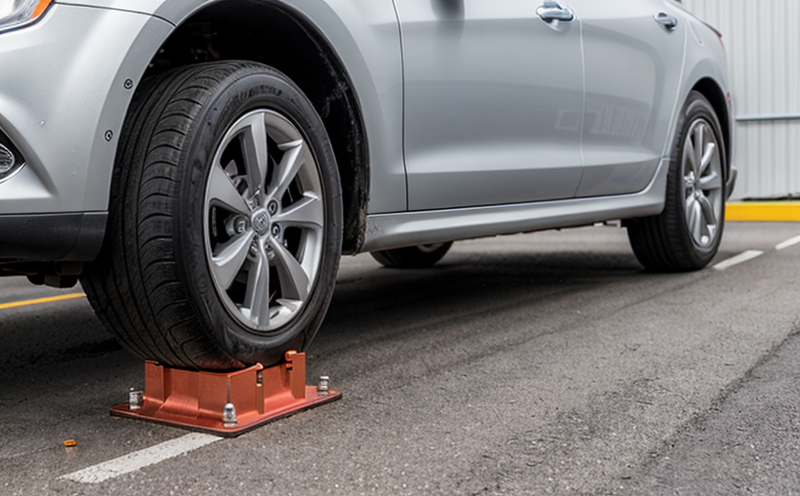Testing for Thermal Stress Resistance in Brake Systems
Unlocking Brake System Reliability Testing for Thermal Stress Resistance in Brake Systems
In the world of automotive engineering, brake systems are among the most critical components that ensure passenger safety on the road. A single malfunction can lead to severe consequences, making it imperative for manufacturers and regulatory bodies to subject these systems to rigorous testing before they hit the market. One crucial aspect of this testing is evaluating a brake systems thermal stress resistance its ability to withstand extreme temperatures without compromising performance or longevity. This article delves into the world of thermal stress resistance testing in brake systems, highlighting its significance and the benefits it offers.
What is Thermal Stress Resistance Testing?
Thermal stress resistance testing in brake systems involves subjecting these components to elevated temperatures to assess their resilience against heat-related stresses. Brake systems are constantly exposed to varying temperature conditions during normal operation, from scorching hot summers to freezing winters. Prolonged exposure to such extremes can cause material degradation, affecting the systems performance and safety. By simulating these thermal stress conditions in a controlled laboratory environment, manufacturers can predict how their brake systems will behave under real-world conditions.
The Importance of Thermal Stress Resistance Testing
Manufacturers must ensure that their products meet or exceed regulatory standards for thermal stress resistance to avoid recalls and maintain customer trust. This testing service is essential for several reasons
Ensures Brake System Safety By evaluating a brake systems ability to withstand thermal stresses, manufacturers can guarantee the safety of vehicles on the road.
Compliance with Regulatory Standards Thermal stress resistance testing helps businesses meet or exceed regulatory requirements set by governing bodies such as SAE (Society of Automotive Engineers), ISO (International Organization for Standardization), and others.
Prevents Costly Recalls Manufacturers who conduct thorough thermal stress resistance testing can identify potential issues before their products hit the market, avoiding costly recalls and reputational damage.
Enhances Product Reliability By subjecting brake systems to rigorous thermal stress resistance testing, manufacturers can ensure that these components will operate reliably over time, reducing maintenance costs and extending product lifespan.
Competitive Advantage Businesses that prioritize thermal stress resistance testing gain a competitive edge in the market by offering safer, more reliable products.
Benefits of Eurolabs Thermal Stress Resistance Testing
Eurolab offers state-of-the-art laboratory facilities where our team of experts conducts comprehensive thermal stress resistance testing on brake systems. The benefits of using our service include
Accurate and Reliable Results Our experienced technicians use the latest technology to simulate real-world thermal stress conditions, providing accurate and reliable results.
Customized Testing Programs We tailor our testing programs to meet your specific needs, ensuring that you receive the exact data required for regulatory compliance and product development.
Timely Turnaround With our efficient laboratory procedures and cutting-edge equipment, we minimize turnaround times without compromising on quality.
Compliance with Global Standards Our testing protocols adhere to international standards such as SAE, ISO, and others, ensuring that your products meet or exceed regulatory requirements worldwide.
QA Frequently Asked Questions
Q What is the typical temperature range used in thermal stress resistance testing?
A The temperature range varies depending on the specific application and product requirements. Common ranges include 150C to 250C for most brake systems.
Q How long does a typical thermal stress resistance test take?
A Test duration depends on the type of testing and equipment used. Our standard tests can take anywhere from a few hours to several days, depending on the complexity of the test.
Q Can Eurolab conduct thermal stress resistance testing on other automotive components besides brake systems?
A Yes, our laboratory facilities are equipped to handle various types of automotive components, including engine components, transmission systems, and more.
Q What kind of data do I receive after conducting thermal stress resistance testing with Eurolab?
A Our comprehensive report includes detailed results, including temperature profiles, material degradation analysis, and performance evaluations. This information helps you make informed decisions about product development and regulatory compliance.
Conclusion
Thermal stress resistance testing is a critical component in ensuring the safety and reliability of brake systems. By partnering with Eurolab for this laboratory service, manufacturers can rest assured that their products meet or exceed regulatory standards while minimizing costly recalls and reputational damage. Whether youre developing new products or improving existing ones, our team of experts will work closely with you to provide accurate and reliable results, giving your business a competitive edge in the market.
Get Ahead of the Competition
Dont let thermal stress-related issues compromise your products performance or safety. Trust Eurolab for comprehensive thermal stress resistance testing services that meet international standards. Contact us today to discuss how our laboratory can support your business needs and stay ahead of the competition.




